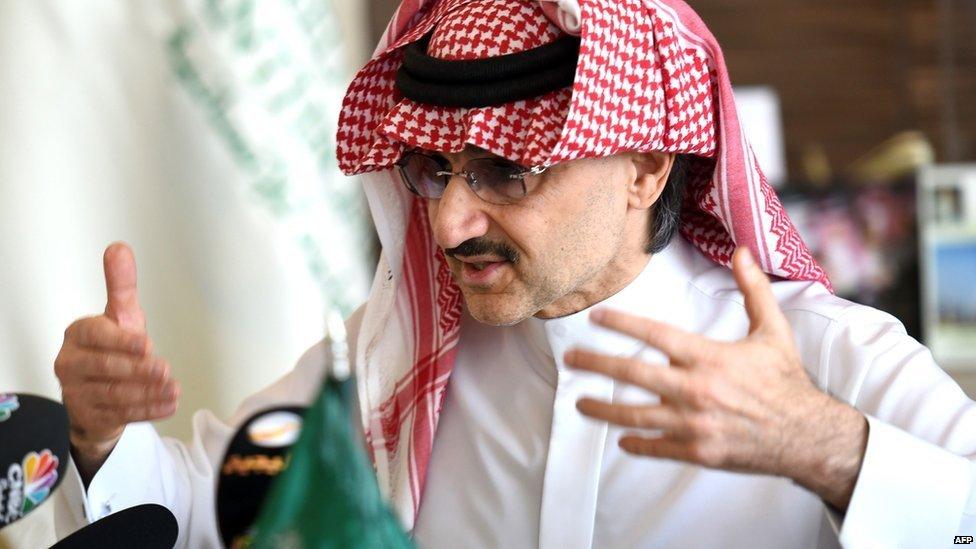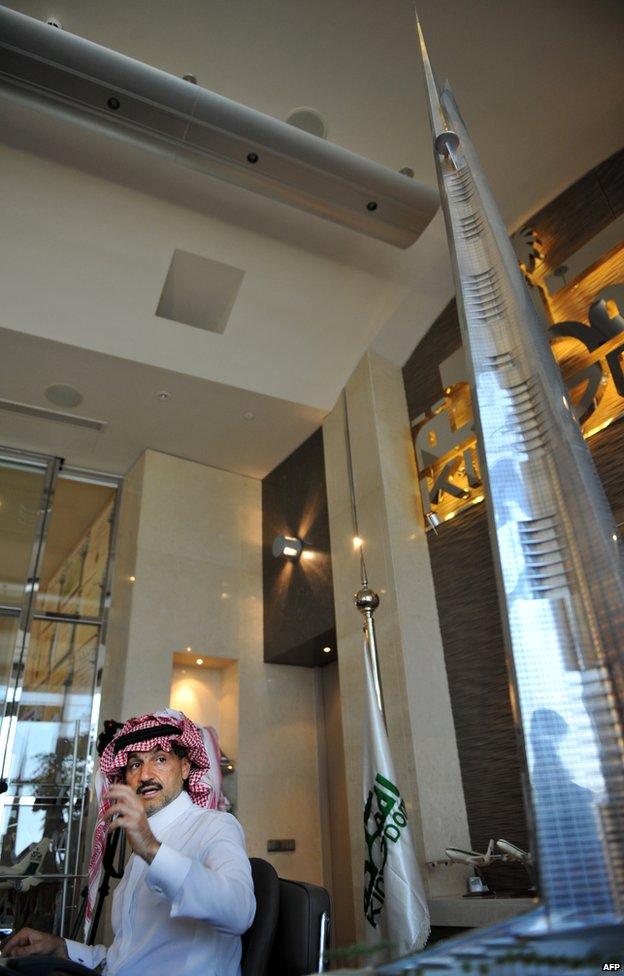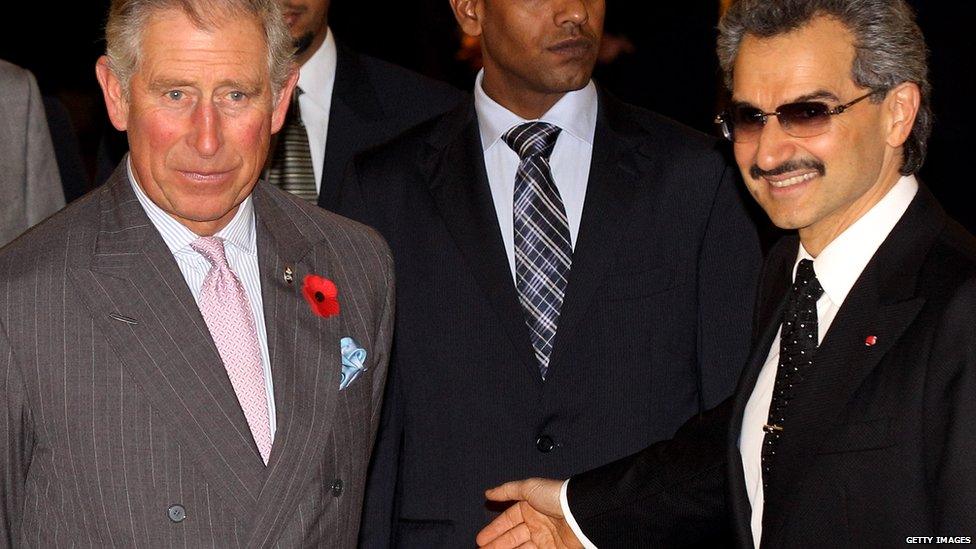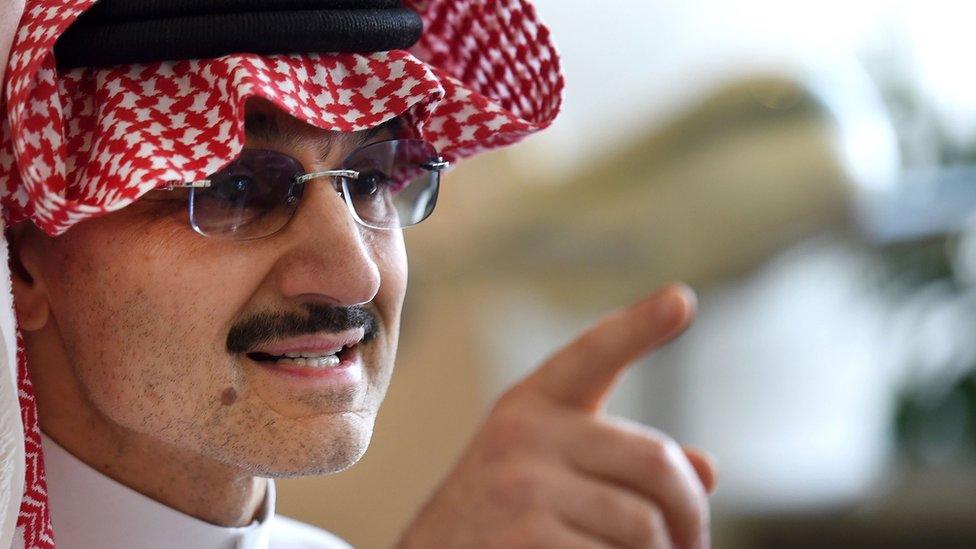Profile: Prince Alwaleed bin Talal
- Published

Prince Alwaleed bin Talal is the self-proclaimed "Warren Buffett of Arabia"
Prince Alwaleed bin Talal's attention span may be just seconds but his attention to detail is huge.
Visitors sitting across the desk from the billionaire on the 66th floor of his office in the Saudi capital Riyadh have to fight for him to focus on them as opposed to the 20 televisions screening 24-hour Arabic and English news stations.
The Arab world's richest man and occasional hunter grips his remote control like a revolver and channel-hops in between sentences. He doesn't like to miss a beat.
In his drawer sits a constantly updated spreadsheet listing how the world's media values his assets, publication by publication, from Forbes magazine to The Sunday Times newspaper. He's fastidious about its accuracy, recently suing Forbes as he claimed billions of dollars were missing from their calculations.
Framed pictures of the relevant pages line the office, next to photographs of Nelson Mandela, George W Bush and Queen Elizabeth with the 60-year-old prince.
The head of Kingdom Holdings, worth an estimated $32bn (£20bn), recently rubbed shoulders with around 100 other CEOs at Bill Gates's annual gathering in Seattle of the world's most influential bosses, one of the leading business hubs on the US West Coast.
It was his fifth meeting with Bill Gates and possibly the one that triggered him to promise this week that his entire personal fortune would be used after his death for humanitarian projects and initiatives.
The prince said he had been inspired by the Gates Foundation, set up by the Microsoft co-founder and his wife Melinda in 1997.
Vast portfolio
It was two gifts he received as a young prince that first started the nephew of King Salman's journey to the top.
They came from his father Prince Talal, the liberal former Saudi communications minister.
He got $330,000 after completing a business degree in California in 1979, but the investments he made with the money flopped.

The prince is planning to build the world's tallest tower in Jeddah
After getting a further $600,000, which he invested in Saudi Arabia's construction industry in the 1980s, his luck changed. Suddenly Prince Alwaleed began to make money and diversify his investments.
The following decade he landed his biggest break yet with a $590m stake in what is now Citigroup. By 2005 the millions had become billions.
As the owner of 95% of Kingdom Holdings, a publicly traded company on the Saudi stock exchange, investments in a range of companies soon paid off for the prince.
The list is a mouth-watering array of high-end and household names ranging from hotels, restaurants, real-estate portfolios, petrochemical, agriculture and healthcare companies and major stakes in the worlds of publishing, entertainment and social media.
To manage his vast portfolio, the workaholic works and plays by his own rules.
He sleeps until 11:00 but that's because he works until 06:00. He builds into his day a calorie-controlled diet and a reflective early morning walk around his estate.
A small band of his closest employees are only required to work six hours a day in his office but won't ever be seen on a coffee break. The prince thinks it's more efficient that way.
He makes his staff's personal issues his business. The father-of-two can be admirably hands-on if an employee needs help but former workers have spoken to journalists about his aggressively short fuse if they suddenly fall out of favour.
Pioneering spirit
Then there are the dwarves.
Whichever press reports you choose to believe, one thing is for sure: he has lots of them on one of many luxurious estates and they are there for entertainment purposes.

Prince Alwaleed co-owns London's Savoy hotel, which was re-opened by Prince Charles in 2010
The bon viveur's team insists the dwarves are grateful recipients of his work ethic and jobs, in a country with high unemployment.
Yet despite playing the jester in his waterfall, spa and sauna-filled, hundred-million-dollar desert resorts, Prince Alwaleed doesn't himself suffer fools gladly. If someone hasn't done their research on an issue, he can stop a conversation dead in its tracks.
He also doesn't do small talk. He is a man on a mission.
His pioneering spirit is evident in his company's employment of women, who make up two-thirds of his staff. They include one of his pilots, in a country where women aren't allowed to drive. Some reports do question whether she actually gets the chance to fly one of his many private jets or not - but that's almost missing the point.
And that is, despite owning hundreds of cars, Donald Trump's old yacht and a fleet of jets, Prince Alwaleed's main obsession is often to use his financial empire to send out audacious social, political and philanthropic messages.
His latest pledge may indeed be the one he is most remembered for.
- Published2 July 2015
